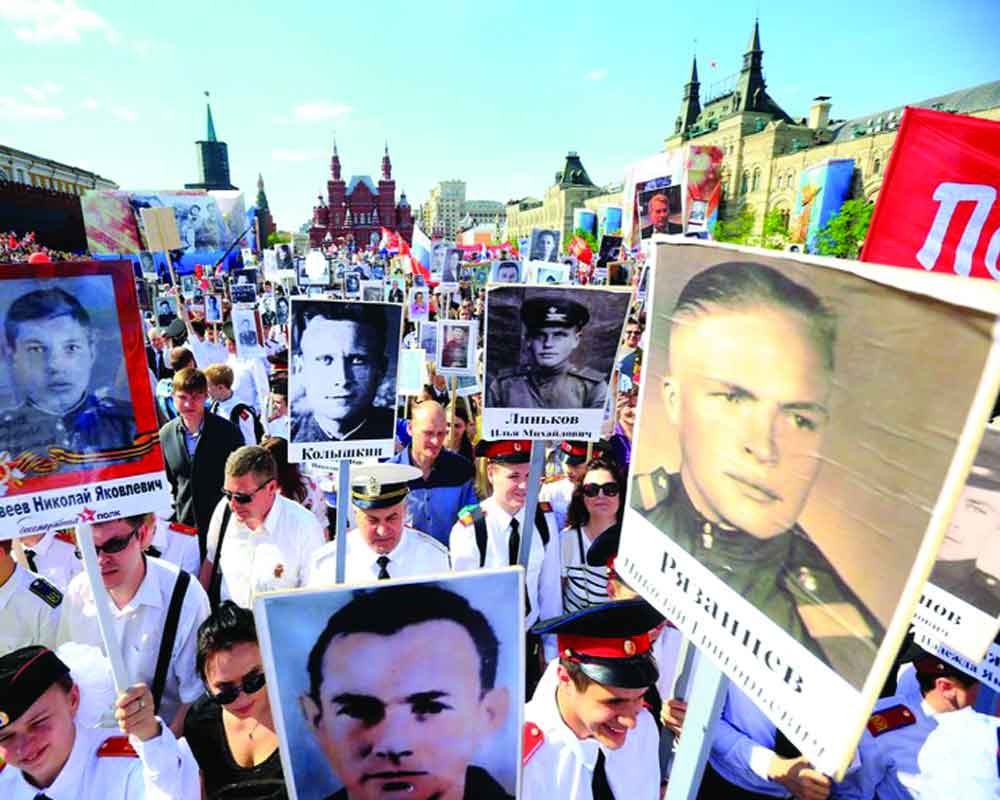It is imperative that the present generation grasps the lessons from Russia’s victory over fascism and the German war machinery
May 9 is one of the most revered days in Russia. This day brings to human memory the horrendous phase of the World War II, which for the people of Russia, marked the great patriotic war between 1941 and 1945. The terrible excesses still linger in the minds of the older generation. The importance of this day also lies in the fact that the Russians still perceive it as the most important event in the 20th century. According to a State poll, almost half of the Russians have planned to attend the Victory Day military parades. Indeed, Russia has a lot to commemorate and honour: The Soviet people and the Red Army chronicled the great victory over fascism with blood and tears, undertaking the supreme sacrifice of 27 million people, thus setting an all-time global toll of human lives. Without their sacrifice, the outcome would have been very different.
This day also commemorates the surrender of Nazi Germany in 1945. It was declared a national holiday and was followed in 15 Republics of the Soviet Union after the signing of the German Instrument of Surrender in the late evening of May 8, 1945. The Soviet Government announced the ‘Victory Day’ on May 9 after the signing ceremony in Berlin. The occasion became a reason for showing its military might.
With Vladimir Putin assuming power, the Russian Government started promoting the prestige of the governing regime and history. Hence, national holidays and communications became a source of national self-esteem. Victory Day in Russia has increasingly become a celebration in which popular culture plays a central role. On this day, President Putin plays host to Moscow’s largest-ever military parade, marking the anniversary of the Great Victory of the Soviet People over Fascism in the Great Patriotic War (1941-1945). In an appropriate gesture, the Russian Centre of Science and Culture (RCSC) in New Delhi, jointly with the Embassy of the Republic of Belarus, marked the 74th Anniversary of the Victory over Fascism in the Great Patriotic War (1941-1945) and the 75th Anniversary of the Liberation of Belarus (July 3, 1944). On this occasion, a seminar titled, ‘Impact and Lessons of the Great Victory of Soviet People over Fascism for Mankind’, was held.
World War II was the deadliest conflict in human history, which saw 50 to 85 million fatalities, most of whom were civilians in the USSR and China. It included massacres, genocides, strategic bombing, deaths from forced starvation and disease and the use of atomic weapons. Operation Bagration, a code name for the 1944 Soviet Belorussian Strategic Offensive Operation, a military campaign fought in Soviet Belorussia in the Eastern Front of World War II, deserves special mention here. The USSR inflicted the biggest defeat in German history, totally shattering the latter’s front line. World War II changed the political alignment and social structure of nations across the globe. This is why the United Nations was established to foster international cooperation and prevent future conflicts among countries. The victorious great powers became Permanent Members of the UN Security Council. In those painfully terrible days encountered by trials, travails and tribulations, practically every Soviet family was deprived either of a father, a husband or a son in the war-front.
Thousands of families were rendered homeless and the people — young and old, men and women, both dead and wounded — were found strewn all around. These accounts of World War II should remind mankind that without Soviet contribution, the destiny of the world would have been indeed unimaginable. It is a lesson for the present generation to bear in mind that it was the Soviet Red Army, which bore the brunt of Hitler’s German war machinery, striking a crushing defeat, and in the process, rescued humanity from the menace of Nazism. Hope mankind has developed the right perspective with sensibility and sensitivity.
(The writer is Media Advisor, Russian Centre of Science and Culture, New Delhi)


























